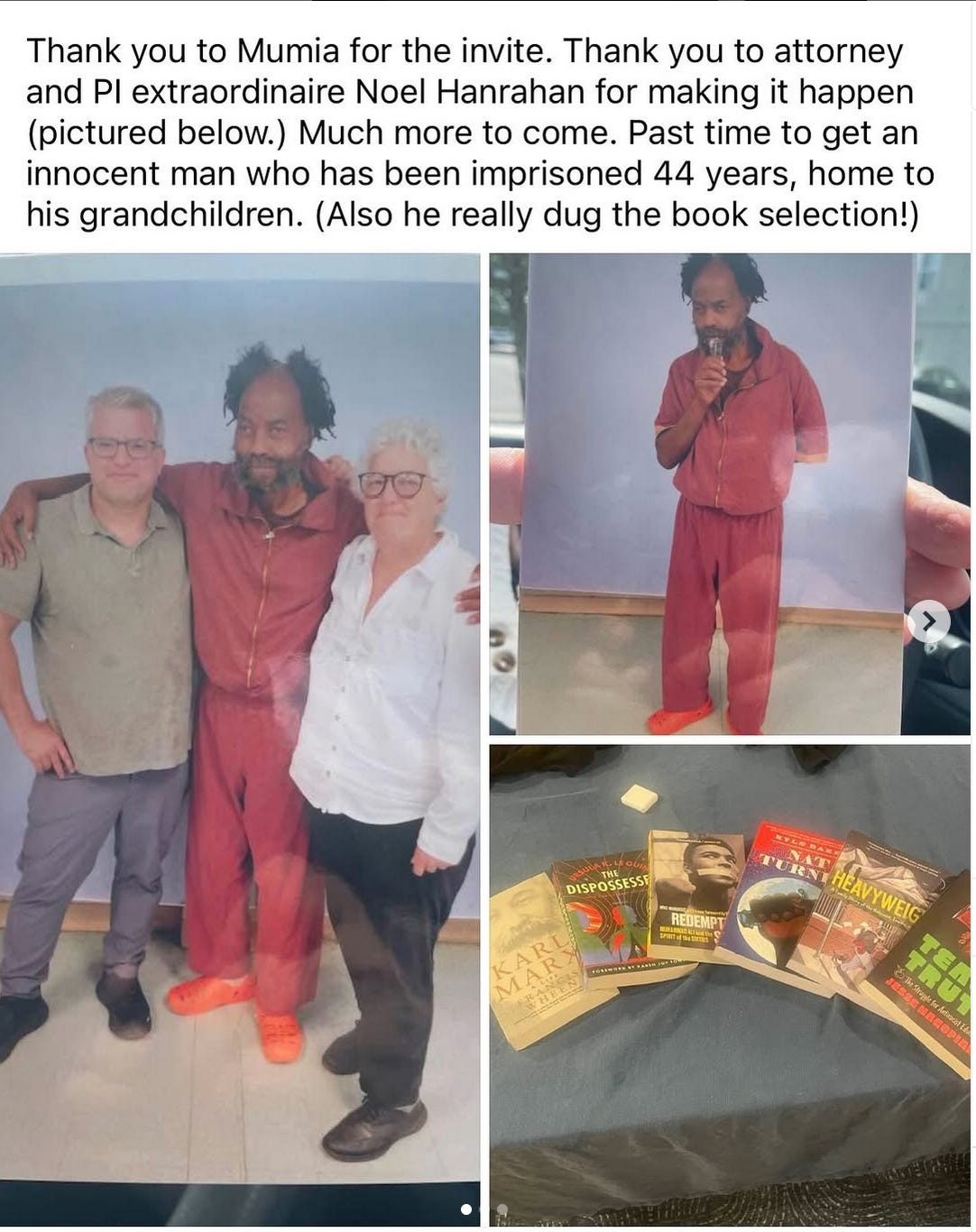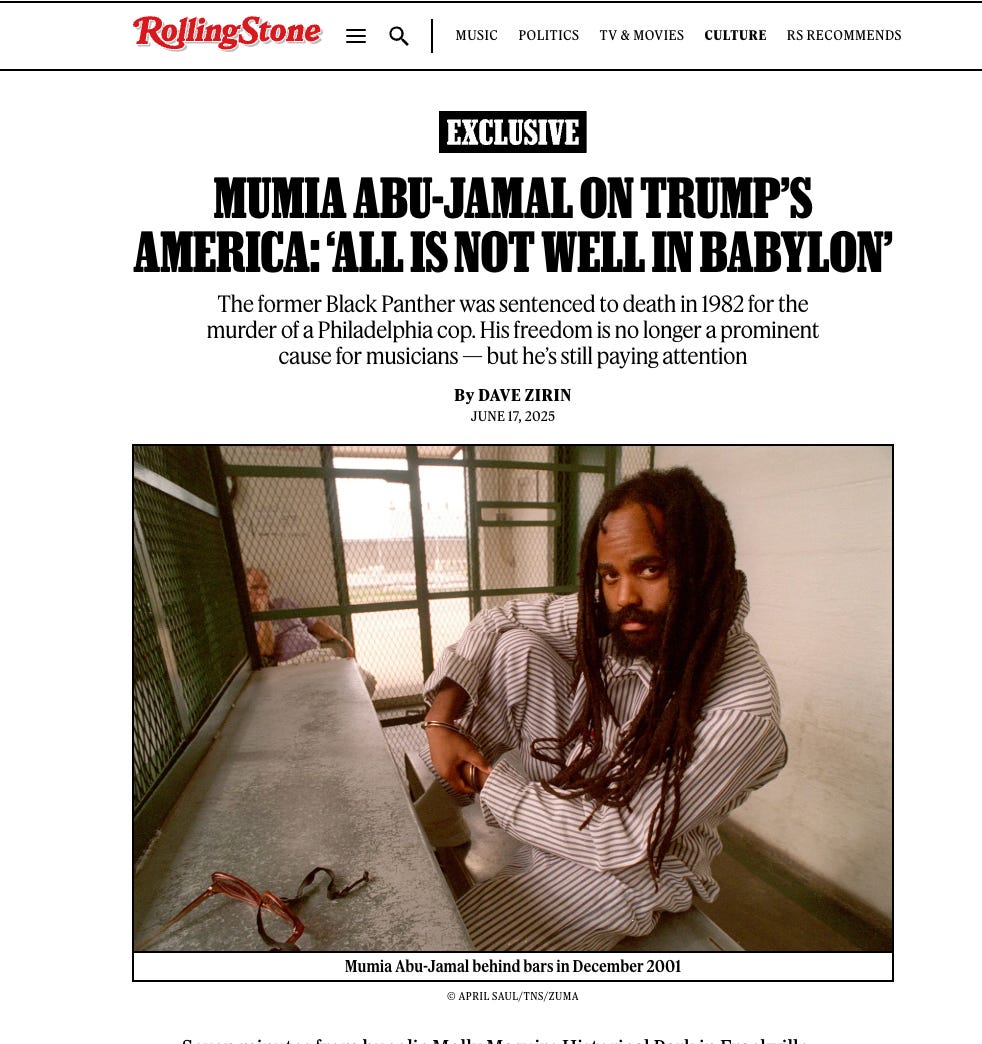I’m still trying to process this moment.
Mumia Abu-Jamal—journalist, freedom fighter, political prisoner—is now holding a copy of my book Teach Truth: The Struggle for Antiracist Education.
Here’s how it happened:
Dave Zirin, sports editor for The Nation and a longtime comrade in the struggle, has been visiting with Mumia recently. Dave was working on a major new interview with Mumia for Rolling Stone—a rare and vital conversation that captures Mumia’s unbroken commitment to justice, even after 44 years behind bars. On one of his visits, Dave brought him 2 copies of Teach Truth—One for him to reed and he signed one to send back to me. One of my most precious possessions.
That alone is incredible. But what makes it even more powerful is this: Mumia’s story is in the book.
In Teach Truth, I share the story of New Jersey educator Marylin Zuniga, who in 2015 was fired for consenting when her students asked if they could write get well letters to the ailing Mumia Abu-Jamal.
The fact that a teacher was terminated simply for allowing her students to express compassion is a chilling reminder of how the state polices both truth and solidarity. That story provides crucial context for today’s “truthcrime” laws—measures banning honest education about U.S. history across the country. I had to include it. And now, Mumia holds those very pages in his hands.
I keep thinking about the moment when Mumia comes across his own story in the book. I hope he smiles. I hope he knows how many of us have carried his name in our mouths, in our classrooms, and in our organizing for decades.
Because for me, this is deeply personal.
Mumia was at the center of my first-ever political protest. I was a teenager, chalking “Free Mumia” on the sidewalks of downtown Seattle. When I read his book, Live from Death Row, and it lit a fire in me that’s never gone out.
That book begins with the line:
“I joined the Philadelphia Branch of the Black Panther Party in the spring of 1969. I had just turned thirty, and like many young Black men, I was disillusioned with the lie that was the United States of America.”
That sentence hit me hard. It named something I had felt but hadn’t yet put into words. Mumia didn’t just name the truth—he survived it. And he kept speaking it, even from inside a cage.
Hearing his voice crackle through speakerphones at activist conferences—broadcasting resistance from death row—taught me something essential:
If Mumia could keep fighting from behind bars, then I could keep fighting on the outside.
And now, decades later, he’s reading my book.
That’s not something I ever imagined. But it reminds me why I wrote Teach Truth in the first place: to honor those who have resisted organized forgetting, to tell the stories we’re told to stay silent about, and to connect today’s struggles for justice to the long arc of liberation movements.
If you’re reading this, here’s what I hope you’ll do:
Read Dave Zirin’s new interview with Mumia in Rolling Stone. It’s an extraordinary conversation with one of the most important political prisoners of our time.
Read Mumia’s books. Start with Live from Death Row, but don’t stop there. His essays, prison writings, and political reflections are among the most urgent and insightful works of Black resistance we have.
Join the call to free him. 44 years is 44 too many. Let’s bring Mumia home to his grandchildren.
Moments like this remind me that while the struggle is long, it is deeply connected. The chalked sidewalk slogans of one generation can turn into books, movements, and messages passed hand to hand.
Thank you, Mumia, for your courage that helps keep the Black freedom struggle alive.
#FreeMumia #TeachTruth #AbolitionNow
-Jesse Hagopian







